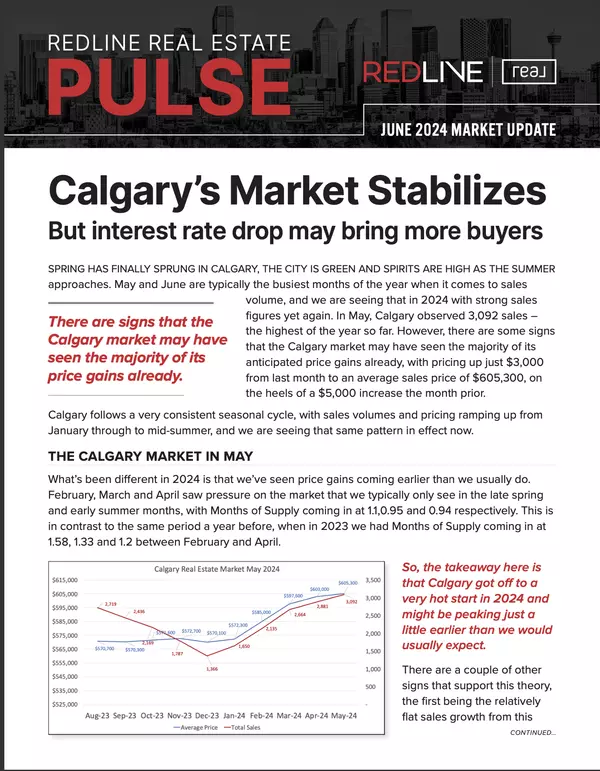May 2024 Market Update

THE HEAT IS ON!
Tight Market Driving the Political Scene
We are one third of the way through what is shaping up to almost certainly be another record-breaking year in Calgary real estate. Calgary finished off 2023 on a bit of a whimper, with six consecutive months of the average sales price being essentially flat at approximately $570,000. But, since turning the corner into 2024, it’s like our market has heard the starter’s pistol and began sprinting at full speed, with healthy increases to the average sales price in each of the last four months amid strong pressure on available supply.
In April, Calgary finally broke through the $600,000 price plateau, coming in at an average sales price of $603,000, which is approximately 5% in total gains since the start of the year and a full $50,000 more than the average sale price just 12 months ago.
Echoing the strong seller’s market conditions we saw in March, April 2024 was also another extremely tight month, coming in at 0.94 months of housing supply. Two months in a row of this kind of pressure almost guarantees that the upward trend in prices will continue as we head into the summer. It also means that, in addition to facing very little selection, would-be buyers will face competition on almost any listing they consider, as more and more buyers compete for fewer and fewer available properties.
The Detached segment inched closer to breaking though a barrier of its own, as the average sale price for a detached property came in at $749,000 in April. Semi-detached pricing came in at $668,400, Row townhouses at $458,000 and Apartment condos at $346,200. All four categories posted double digit gains over the figures we observed in April of 2023.

It’s not just prices that are going up, though. Our market is getting more active, with a little over 200 more sales in April than in March, to a total of 2,881. New listings are up, too, with just under 3,500 new properties coming to market last month.

Last month we explored some of the reasons that our market has been so hot this year – lots of positive net migration, employment gains and our relative affordability compared to Vancouver and Toronto being the key factors. This month we’ve observed the politicisation of housing reform, as all three orders of government made headlines trying to win points with the voting public as attempts at increasing supply are made to address the “housing crisis” – an issue so pervasive across Canada that it will remain in the policy conversation for years to come.
In April, Calgary observed a record-setting public hearing at city council, when over 700 people signed up to speak to council for five minutes each regarding the proposed amendment to the bylaw, which would change the base zoning in Calgary from R-C1 to R-CG. If approved, every lot in Calgary would now be zoned to allow up to four dwelling units as opposed to just one. It’s a big change that has really stirred the interests of Calgarians.
The issue goes back to September of 2023, when city council gathered for an emergency session to debate the proposed bylaw amendments brought forth by a panel of experts that made up the “housing affordability task force”. It was this task force that recommended changing the base zoning. After a day of debate, city councillors voted in favor of the recommendations 12-3, which set in motion months of community engagement and then, ultimately, the hearings that took place this month prior to a vote by council.
But it was shortly after the September 2023 vote in acceptance of the task force’s recommendations that the federal government promised Calgary $228 million dollars in housing support… as long as they ‘removed exclusionary zoning’ from the city’s land-use bylaw. Mayor Gondek, one of the supporters of zoning reform, latched onto this offer as one of the reasons to move forward with the change.
Displeased with the federal government going around the provincial government, Alberta premier Danielle Smith then proposed Bill 18, a bill that – if enacted – would make it illegal for Alberta municipalities to accept federal funding without first obtaining approval from the provincial government. Cleary a centralization of power for the provincial government, and perhaps not in the best interests of constituents who could use the federal funding regardless of any hurdles the Alberta government seeks to put in place.
We can see how such a pressured real estate market is driving politics at all three levels
Shortly after Bill 18 was proposed, the Alberta government also proposed Bill 20 – the “Municipal Affairs Statutes Amendment Act” – which would give the Alberta cabinet the power to dismiss councillors and mayors in any municipality and also repeal or amend local bylaws. In addition to
Categories






